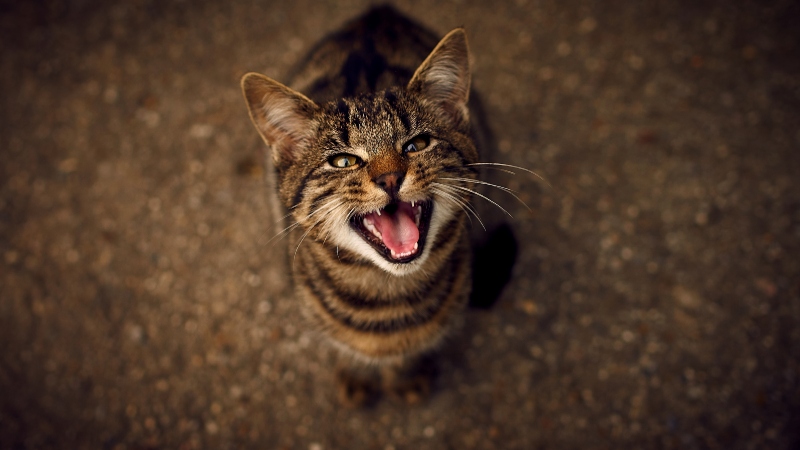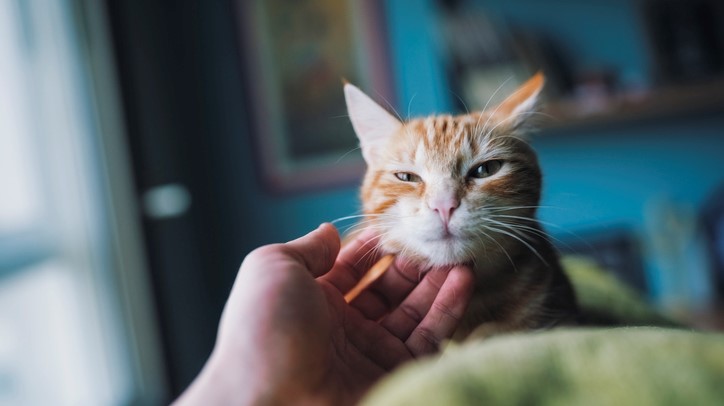Why do cats meow?
Did you know this feline language is used specifically to talk to humans?

Get the best advice, tips and top tech for your beloved Pets
You are now subscribed
Your newsletter sign-up was successful
Why do cats meow? You might think you’ve become pretty good at communicating with your cat, and it may seem that they understand you too. Perhaps you’ve tried a cat translator such as Meowtalk to find out if your kitty is saying more than just “I’m hungry” or “pet me please”.
It is said that long-term cat owners can understand around 40% of their cat’s meows, which is pretty impressive, and this is all down to the high-pitched sounds that cats have developed over time. When compared to the roars of their distant wild cat cousins, it would seem that domestic cat meows have evolved to be softer on the ear, making them more positively received by humans, which ultimately results in owners tending to the cat as they would a child.
But cats didn’t always use meowing as a form of communication, and adult cats don’t meow at one another. Meowing is something that a kitten does to communicate to their mother, but when they grow up, they no longer use this form of communication cat-to-cat.
So that leads us to ask when and why this feline language developed.
- Best cat toys: Keep your feline friend occupied with these great toys
- The best dry cat foods: King of cat kibble revealed
- Best microchip cat flap: Keep out unwanted feline guests
Why do cats meow?
It is since cats became domesticated animals, which is as long as 10,000 years ago, that they began speaking this feline language. Before this time, cats were very solitary animals and rarely needed to use their voices to communicate. So why do cats meow at their owners?
Since becoming pets, cats have learned to use their voices to communicate with their owners simply because we do not respond to other forms of communication (I don’t think any of us would respond positively to our cats marking their territory on our brand new sofa). Along with this, cats now also enjoy the company of humans, despite what some cat behavior might suggest, and so they have learned this new dialogue in order to converse with us.
Cats are intelligent and manipulative creatures, with plenty of videos out there showing cats knocking things over seemingly on purpose, and reacting to their owner’s behavior in different ways (check out our round-up of the funniest cat videos of 2020). Many scientists believe that cats have instinctively refined their meows over the years in order to win over humans to get what they want.
Get the best advice, tips and top tech for your beloved Pets
What does your cat’s meow mean?

There are a number of different reasons why your cat may be meowing at you, many of which you have likely already figured out through trial and error, but there may still be some sounds that you’re unsure of. Whiskas suggest that some of the most common meows include hunger, greetings, broodiness, stress, or attention-seeking.
If you are having issues with cat behavior problems, then understanding their meows could help with this. For example, a short, high-pitched meow likely means “hello”, while a long and drawn-out low-pitched meow suggests a feeling of anger or frustration. Mid-pitched meows are often your cat’s way of asking you for something such as food or playtime, and multiple meows is a call for attention.
If you want to encourage your cat to meow more, then opening up a conversation is the best way to start to understand each other better. When your cat meows, be sure to respond positively and you’ll likely begin to see your cat become more and more vocal, and even begin to understand your commands too.
All cats communicate differently, with some more vocal than others, so if you’re thinking of adopting a kitty this year, then find out what cat breed is right for you in our handy guide.
If your female cat is in heat, then you might find yourself questioning ‘Are cats in pain when in heat?’ This feature explains what the constant meowing is all about. You might also be questioning why do cats rub their face on things?
Sarah is a freelance writer and marketer, covering a variety of topics from lifestyle and fitness to sustainability and travel. When she’s not writing for PetsRadar or other websites, she can be found looking after her pet chickens or relaxing with a cuppa and a cute doggo snoozing on her lap!

